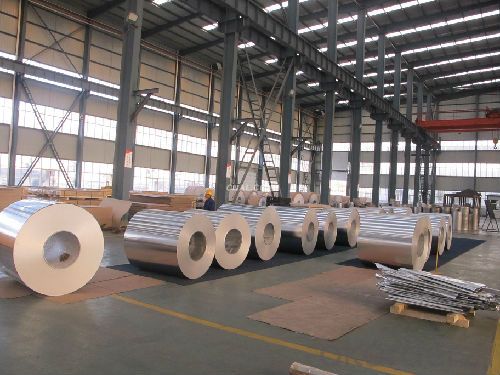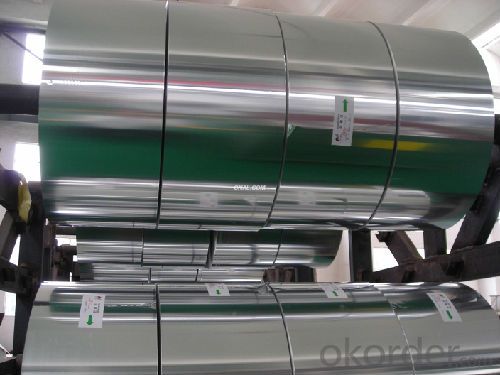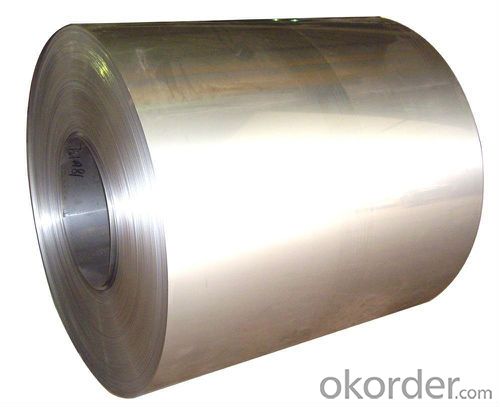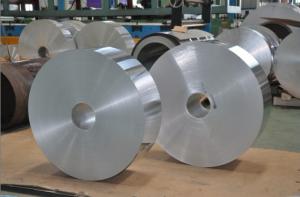Mill Finished Aluminum Coil and Sheet from China
- Loading Port:
- Shanghai
- Payment Terms:
- TT or LC
- Min Order Qty:
- 5 m.t.
- Supply Capability:
- 9000 m.t./month
OKorder Service Pledge
OKorder Financial Service
You Might Also Like
Specifications
1)0.02mm-200mm aluminum sheet,coil,foil,circle
2)mill finish mirror finish
3)process: CC&DC
4)paper interleave & PVC Film

product | thickness | alloy | temper | |
aluminium sheet,coil,foil, circle,strip | 0.16-200mm | 1070 1060 1050 1145 1235 1100 1200 3003 8011 3005 5005 3105 | H18 H26 H14 H24 H22 O | |

Our Services
Why Chose us?
Factory | We are a factory manufacturing aluminum coil, sheets, foil. strip, circle, ACP and coated coil. We have best production capability, best quality control, best Service. |
24-hours working | Contact line is 24-hours available for your any question before sales and after sales. |
Flexible MOQ | Any quantity is available if we have your specification in stock. |
Shipping company | Introduce to you our good partner--experienced shipping company with competitive price |
OEM service: | Accept your own design |
Strict Quality Controlling | CE/ISO/IAF/SGS listed |
Trade assurance service | We are Alibaba Assessed years Gold Supplier and suppport trade assurance service. |
Free Sample | We supply sample for free. |
Shipping company | Introduce you our good partner--experienced shipping company with competitive price |

- Q:I want to separate the copper and aluminum so I will get more at the scrap yard for my radiators any one know of an easy way to do this? Thanks
- Does your scrapyard not have a good price for aluminum/copper radiators? Mine does. I Don't think you can separate them short of melting off the aluminum. The copper goes right through it. It would be a lot of work to separate them. Much more work than stripping copper wire. Before I take a load of scrap, I call all of the yards and get the best price. Sometimes this varies as much as $.50/pound on copper and radiators and brass and clean aluminum. Work with your phone, it will make you money. Last I checked, #1 copper 3.10/pound #2: 2.90, Radiators $1.50, Brass $1.40, Insulated copper wire $1.10 to $.90 Aluminum $.85 to $.55 dependingScrap Metal(steel). $9.00/100 Lets recycle Car batteries are $6 ea.
- Q:Can aluminum coils be painted?
- Yes, aluminum coils can be painted. However, it is important to follow proper surface preparation and use a suitable paint that is compatible with aluminum to ensure a long-lasting and durable finish.
- Q:What are the strength properties of aluminum coils?
- Aluminum coils possess several strength properties that make them highly desirable in various applications. Firstly, aluminum has a high strength-to-weight ratio, which means that it is lightweight while still maintaining good strength. This makes aluminum coils ideal for industries where weight reduction is important, such as in the automotive and aerospace sectors. Additionally, aluminum coils offer excellent corrosion resistance, even when exposed to harsh environments. This corrosion resistance is due to the formation of a protective oxide layer on the surface of the aluminum, which helps to prevent further degradation. Moreover, aluminum coils display good formability and ductility, allowing them to be easily shaped and formed into different products without compromising their structural integrity. This makes them suitable for various manufacturing processes, including rolling, bending, and stamping. Furthermore, aluminum coils possess good electrical and thermal conductivity, making them ideal for applications requiring efficient heat transfer or electrical conductivity, such as in heat exchangers or electrical wiring. In summary, the strength properties of aluminum coils include high strength-to-weight ratio, excellent corrosion resistance, good formability, and ductility, as well as efficient electrical and thermal conductivity. These characteristics contribute to the versatility and widespread use of aluminum coils in numerous industries.
- Q:Are aluminum coils compatible with other building materials?
- Yes, aluminum coils are compatible with other building materials. Aluminum is a versatile material that can be used in conjunction with various building materials such as steel, concrete, glass, and wood. It is commonly used in construction projects for roofing, cladding, and façade systems, as well as in HVAC and electrical applications. Aluminum's corrosion resistance and lightweight properties make it a preferred choice for integration with other building materials.
- Q:How are aluminum coils protected against scratching and abrasion?
- Aluminum coils are protected against scratching and abrasion through various methods and coatings. One common method is the application of a protective film or coating on the surface of the coils. This film acts as a barrier, shielding the aluminum from external forces that could cause scratching or abrasion. Additionally, aluminum coils can undergo a process known as anodizing. Anodizing is an electrochemical method that creates a protective layer on the surface of the aluminum. This layer not only enhances the coil's resistance to scratching and abrasion but also provides it with increased durability and corrosion resistance. Another technique used to protect aluminum coils is the application of a protective lacquer or paint. This coating not only enhances the visual appearance of the coils but also acts as a barrier against potential scratches or abrasion. These protective coatings can be customized to meet specific requirements, such as UV resistance or chemical resistance. Furthermore, aluminum coils can be manufactured with a textured or patterned surface. This texturing creates a more robust surface that is less prone to scratching or abrasion. The texture helps distribute external forces more evenly, reducing the likelihood of damage. Overall, a combination of protective films, anodizing, protective coatings, and textured surfaces are employed to safeguard aluminum coils against scratching and abrasion, ensuring their longevity and performance in various applications.
- Q:How are aluminum coils protected from damage during transportation?
- To protect aluminum coils during transportation, a combination of packaging materials and handling precautions is utilized. Initially, the coils are wrapped with materials like stretch film or plastic wrap to prevent scratches and abrasions, thus maintaining the coil's surface integrity and preventing potential damage. Moreover, the coils are typically placed on sturdy wooden pallets or skids, providing a stable base for transportation. This reduces movement and shifting during transit, avoiding dents or deformations in the coils. Additionally, steel or plastic strapping is used to secure the coils, ensuring their stability and preventing unintended unwrapping or unrolling. The straps are tightly fastened around the coils and pallets, creating a secure bundle capable of withstanding jostling and vibrations during transportation. During loading and unloading, specialized equipment like forklifts or cranes is employed to handle the coils carefully, reducing the risk of dropping or mishandling that could result in significant damage. In summary, a combination of protective packaging materials, secure pallets, and careful handling procedures is employed to protect aluminum coils during transportation. These measures aim to preserve the coils' quality and structural integrity, ensuring they reach their destination in optimal condition.
- Q:What are the different coil packaging materials used for aluminum coils?
- There are several different coil packaging materials commonly used for aluminum coils. These materials are designed to protect the coils during transportation and storage, ensuring they arrive at their destination in good condition. One of the most popular coil packaging materials for aluminum coils is plastic. Plastic packaging can come in the form of shrink wrap, stretch film, or plastic bands. Shrink wrap is often used to tightly encase the coils, providing a secure and protective covering. Stretch film, on the other hand, is used to tightly wrap the coils together, preventing them from shifting and potentially causing damage. Plastic bands are used to secure the coils together, offering an additional layer of stability. Another commonly used packaging material for aluminum coils is paper. Kraft paper or corrugated cardboard is often used to wrap and protect the coils. This type of packaging provides cushioning and prevents the coils from scratching or rubbing against each other during transit. Paper packaging is also easily recyclable, making it an environmentally friendly option. In addition to plastic and paper, steel strapping is sometimes used to package aluminum coils. Steel strapping offers excellent strength and durability, ensuring that the coils remain securely bundled during transportation. This type of packaging material is particularly useful for heavy-duty applications where extra protection is needed. Overall, the choice of coil packaging material for aluminum coils depends on factors such as the size and weight of the coils, transportation requirements, and the level of protection needed. By using the right packaging materials, aluminum coils can be safeguarded against damage and arrive at their destination in optimal condition.
- Q:What are the different coil annealing options available for aluminum coils?
- There are several coil annealing options available for aluminum coils, depending on the desired outcome and requirements. 1. Full Annealing: This is a process where the aluminum coil is heated to a specific temperature and then slowly cooled down. Full annealing helps to relieve internal stresses, improve ductility, and enhance the mechanical properties of the coil. It also results in a soft and fully recrystallized structure. 2. Solution Annealing: Solution annealing is primarily used for heat-treatable aluminum alloys. It involves heating the coil to a temperature above the alloy's solvus temperature, followed by rapid cooling. This process helps dissolve and redistribute any alloying elements, resulting in a homogenous microstructure. 3. Stabilization Annealing: Stabilization annealing is performed on certain aluminum alloys to enhance their dimensional stability and reduce the risk of distortion during subsequent processing or usage. It involves heating the coil to a temperature just below the alloy's recrystallization temperature and then slowly cooling it. 4. Stress Relief Annealing: This type of annealing is performed to relieve residual stresses that may have developed during previous manufacturing processes, such as rolling or stretching. The coil is heated to a specific temperature and held there for a certain duration, allowing the stresses to relax. It helps to improve the coil's formability and minimize the risk of deformation during subsequent operations. 5. Intermediate Annealing: Intermediate annealing is performed during the manufacturing process to restore the ductility and formability of the aluminum coil. It involves heating the coil to a temperature below the recrystallization temperature, followed by a controlled cooling process. This helps to eliminate work hardening that may have occurred during previous operations. These are some of the common coil annealing options available for aluminum coils. The specific choice depends on factors such as the alloy composition, intended application, and desired material properties. It is important to consult with experts or heat treatment professionals to determine the most suitable annealing method for a particular aluminum coil.
- Q:How to deal with too much aluminum powder in aluminum striping?
- Currently, there are bag dust-removal system and water dust-removal system. The former is very popular with enterprises because of low maintenance cost, accounting for over 90%. But the problem is the dust accumulation because the ventilation and dust removal systems are not produced in strict accordance with the standard. For example, controlling wind speed does not meet the requirement; ventilation and dust removal system does not meet the requirements of explosion-proof, including the set of pipes, series and parallel connection, the choice of dust removal system, the spark detection and extinguishing measures.
- Q:Are aluminum coils suitable for beverage can manufacturing?
- Yes, aluminum coils are suitable for beverage can manufacturing.
1. Manufacturer Overview |
|
|---|---|
| Location | |
| Year Established | |
| Annual Output Value | |
| Main Markets | |
| Company Certifications | |
2. Manufacturer Certificates |
|
|---|---|
| a) Certification Name | |
| Range | |
| Reference | |
| Validity Period | |
3. Manufacturer Capability |
|
|---|---|
| a)Trade Capacity | |
| Nearest Port | |
| Export Percentage | |
| No.of Employees in Trade Department | |
| Language Spoken: | |
| b)Factory Information | |
| Factory Size: | |
| No. of Production Lines | |
| Contract Manufacturing | |
| Product Price Range | |
Send your message to us
Mill Finished Aluminum Coil and Sheet from China
- Loading Port:
- Shanghai
- Payment Terms:
- TT or LC
- Min Order Qty:
- 5 m.t.
- Supply Capability:
- 9000 m.t./month
OKorder Service Pledge
OKorder Financial Service
Similar products
New products
Hot products
Hot Searches
Related keywords






























